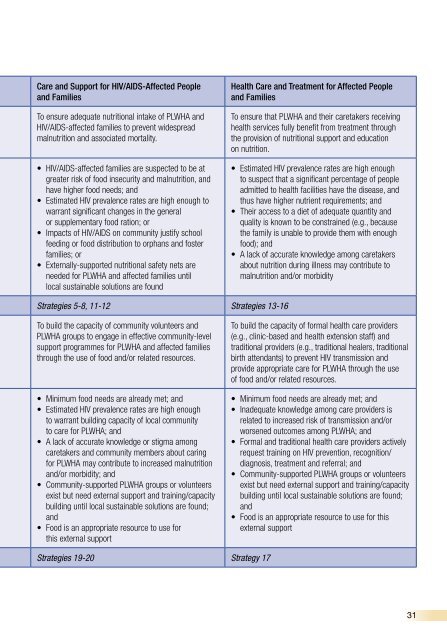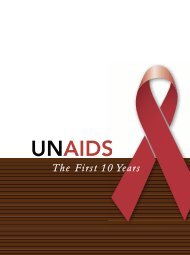Integration of HIV/AIDS activities with food and nutrition support in ...
Integration of HIV/AIDS activities with food and nutrition support in ...
Integration of HIV/AIDS activities with food and nutrition support in ...
Create successful ePaper yourself
Turn your PDF publications into a flip-book with our unique Google optimized e-Paper software.
Care <strong>and</strong> Support for <strong>HIV</strong>/<strong>AIDS</strong>-Affected People<br />
<strong>and</strong> Families<br />
To ensure adequate <strong>nutrition</strong>al <strong>in</strong>take <strong>of</strong> PLWHA <strong>and</strong><br />
<strong>HIV</strong>/<strong>AIDS</strong>-affected families to prevent widespread<br />
mal<strong>nutrition</strong> <strong>and</strong> associated mortality.<br />
• <strong>HIV</strong>/<strong>AIDS</strong>-affected families are suspected to be at<br />
greater risk <strong>of</strong> <strong>food</strong> <strong>in</strong>security <strong>and</strong> mal<strong>nutrition</strong>, <strong>and</strong><br />
have higher <strong>food</strong> needs; <strong>and</strong><br />
• Estimated <strong>HIV</strong> prevalence rates are high enough to<br />
warrant significant changes <strong>in</strong> the general<br />
or supplementary <strong>food</strong> ration; or<br />
• Impacts <strong>of</strong> <strong>HIV</strong>/<strong>AIDS</strong> on community justify school<br />
feed<strong>in</strong>g or <strong>food</strong> distribution to orphans <strong>and</strong> foster<br />
families; or<br />
• Externally-<strong>support</strong>ed <strong>nutrition</strong>al safety nets are<br />
needed for PLWHA <strong>and</strong> affected families until<br />
local susta<strong>in</strong>able solutions are found<br />
Strategies 5-8, 11-12 Strategies 13-16<br />
To build the capacity <strong>of</strong> community volunteers <strong>and</strong><br />
PLWHA groups to engage <strong>in</strong> effective community-level<br />
<strong>support</strong> programmes for PLWHA <strong>and</strong> affected families<br />
through the use <strong>of</strong> <strong>food</strong> <strong>and</strong>/or related resources.<br />
• M<strong>in</strong>imum <strong>food</strong> needs are already met; <strong>and</strong><br />
• Estimated <strong>HIV</strong> prevalence rates are high enough<br />
to warrant build<strong>in</strong>g capacity <strong>of</strong> local community<br />
to care for PLWHA; <strong>and</strong><br />
• A lack <strong>of</strong> accurate knowledge or stigma among<br />
caretakers <strong>and</strong> community members about car<strong>in</strong>g<br />
for PLWHA may contribute to <strong>in</strong>creased mal<strong>nutrition</strong><br />
<strong>and</strong>/or morbidity; <strong>and</strong><br />
• Community-<strong>support</strong>ed PLWHA groups or volunteers<br />
exist but need external <strong>support</strong> <strong>and</strong> tra<strong>in</strong><strong>in</strong>g/capacity<br />
build<strong>in</strong>g until local susta<strong>in</strong>able solutions are found;<br />
<strong>and</strong><br />
• Food is an appropriate resource to use for<br />
this external <strong>support</strong><br />
Strategies 19-20 Strategy 17<br />
Health Care <strong>and</strong> Treatment for Affected People<br />
<strong>and</strong> Families<br />
To ensure that PLWHA <strong>and</strong> their caretakers receiv<strong>in</strong>g<br />
health services fully benefit from treatment through<br />
the provision <strong>of</strong> <strong>nutrition</strong>al <strong>support</strong> <strong>and</strong> education<br />
on <strong>nutrition</strong>.<br />
• Estimated <strong>HIV</strong> prevalence rates are high enough<br />
to suspect that a significant percentage <strong>of</strong> people<br />
admitted to health facilities have the disease, <strong>and</strong><br />
thus have higher nutrient requirements; <strong>and</strong><br />
• Their access to a diet <strong>of</strong> adequate quantity <strong>and</strong><br />
quality is known to be constra<strong>in</strong>ed (e.g., because<br />
the family is unable to provide them <strong>with</strong> enough<br />
<strong>food</strong>); <strong>and</strong><br />
• A lack <strong>of</strong> accurate knowledge among caretakers<br />
about <strong>nutrition</strong> dur<strong>in</strong>g illness may contribute to<br />
mal<strong>nutrition</strong> <strong>and</strong>/or morbidity<br />
To build the capacity <strong>of</strong> formal health care providers<br />
(e.g., cl<strong>in</strong>ic-based <strong>and</strong> health extension staff) <strong>and</strong><br />
traditional providers (e.g., traditional healers, traditional<br />
birth attendants) to prevent <strong>HIV</strong> transmission <strong>and</strong><br />
provide appropriate care for PLWHA through the use<br />
<strong>of</strong> <strong>food</strong> <strong>and</strong>/or related resources.<br />
• M<strong>in</strong>imum <strong>food</strong> needs are already met; <strong>and</strong><br />
• Inadequate knowledge among care providers is<br />
related to <strong>in</strong>creased risk <strong>of</strong> transmission <strong>and</strong>/or<br />
worsened outcomes among PLWHA; <strong>and</strong><br />
• Formal <strong>and</strong> traditional health care providers actively<br />
request tra<strong>in</strong><strong>in</strong>g on <strong>HIV</strong> prevention, recognition/<br />
diagnosis, treatment <strong>and</strong> referral; <strong>and</strong><br />
• Community-<strong>support</strong>ed PLWHA groups or volunteers<br />
exist but need external <strong>support</strong> <strong>and</strong> tra<strong>in</strong><strong>in</strong>g/capacity<br />
build<strong>in</strong>g until local susta<strong>in</strong>able solutions are found;<br />
<strong>and</strong><br />
• Food is an appropriate resource to use for this<br />
external <strong>support</strong><br />
31

















